Posted on October 17, 2010 by The Orwell Prize -
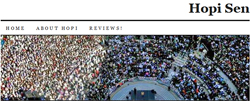
My name is Hopi Sen. Really. Escaping a lucrative career in advertising (which ended when I saw a lifetime of Daz adverts stretching before me and resigned in panic) I started work for the Labour party as the Northern region press officer in 2000. After the 2001 election I moved to Party HQ, before becoming the head of campaigns at the Parliamentary Labour Party. I had various stints on by-elections and General Elections- like working as a press officer to the Leader of the party during the 2005 campaign, a job that mostly involved feeding journalists chocolate and offending Quentin Letts. For six years I was one of those people who are occasionally glimpsed in the background of a photo-op, looking stressed in a cheap suit and in all likelihood sweating profusely. We’re a noble and maligned breed. Now I’ve escaped.
Submitted blogposts
Other links
- Hopi Sen
- Hopi Sen, Jo Glanville and Maajid Nawaz, ‘1984: Thoughtcrime’, Orwell Festival 2009
Posted on October 17, 2010 by The Orwell Prize -

Performer, writer, broadcaster and blogger. Madam Miaow casts a sharp eye over the political and cultural landscape and takes a scalpel and a shotgun to the guilty parties. “Just imagine, the whole place being upset by one little Chinese girl in the scullery.” (Piccadilly, 1929)
Submitted blogposts
Other links
Posted on October 17, 2010 by The Orwell Prize -

Foreign Matters tries to join the dots and tell it like it is. Postions? It takes them. Debates? It makes them. Some blogs will use the language of diplomats without translation, Foreign Matters seeks to explain that a ‘Working Group’ is 5 or more people sitting in a room failing to achieve anything, and a ‘ Bi-lateral’ is a meeting involving two people chatting.
Submitted blogposts
Other links
Posted on October 17, 2010 by The Orwell Prize -

David Reynolds was shortlisted for a series of pieces on America, Empire of Liberty on BBC Radio 4 and BBC News Online. The Professor of International History at Cambridge University and a Fellow of Christ’s College, he is a regular visitor to the United States and has held visiting university appointments at Harvard, Nebraska and Oklahoma.
Submitted articles
Other links
Posted on October 17, 2010 by The Orwell Prize -
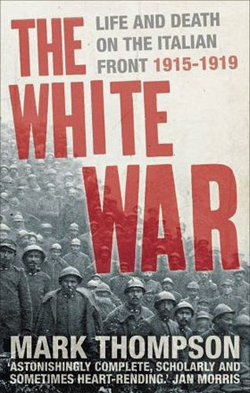
The first narrative history in English of the Italian front: a major forgotten conflict of the First World War. In May 1915, Italy declared war on the Habsburg Empire, hoping to seize its ‘lost’ territories of Trieste and Tyrol. The result was one of the most hopeless and senseless modern wars – and one that inspired great cruelty and destruction. Nearly three-quarters of a million Italians – and half as many Austro-Hungarian troops – were killed. Most of the deaths occurred on the bare grey hills north of Trieste, and in the snows of the Dolomite Alps. Outsiders who witnessed these battles were awestruck by the difficulty of attacking on such terrain. General Luigi Cadorna, most ruthless of all the Great War commanders, restored the Roman practice of ‘decimation’, executing random members of units that retreated or rebelled. Italy sank into chaos and, eventually, fascism. Its liberal traditions did not recover for a quarter of a century – some would say they have never recovered. Mark Thompson relates this nearly incredible saga with great skill and pathos. Much more than a history of terrible violence, the book tells the whole story of the war: the nationalist frenzy that led up to it, the decisions that shaped it, the poetry it inspired, its haunting landscapes and political intrigues; the personalities of its statesmen and generals; and also the experience of ordinary soldiers – among them some of modern Italy’s greatest writers. A work of epic scale, The White War does full justice to one of the most remarkable untold stories of the First World War.
- Mark Thompson, Patricia Clavin and Will Hutton on ‘How do we avoid political crisis after economic crash?’ at the Sunday Times Oxford Literary Festival 2009
Posted on October 17, 2010 by The Orwell Prize -

The war on terror is being lost – but not just in Iraq. As this devastating book shows, the real crisis zone now lies in central Asia. Veteran reporter Ahmed Rashid has unparalleled access to the region and knows its leading players, from presidents to warlords. Here he documents how closely Pakistan’s US-backed regime is linked with extremists; how broken promises in Afghanistan have led to a resurgent Taliban fed by drugs money; and how the largest landmass in the world is now a breeding ground for terrorism. In this story of squandered opportunities, misguided alliances and double-dealing, Rashid pinpoints with chilling accuracy where the true threat to our global security comes from.
Posted on October 17, 2010 by The Orwell Prize -

Andrew Sparrow is the senior political correspondent on The Guardian website. He trained as a journalist on the South Wales Echo. Since joining the parliamentary lobby in 1994, he has worked as a political correspondent for Thomson Regional Newspapers, the Western Mail, the Daily Mail and the Daily Telegraph. He has also written a book – Obscure Scribblers: A History of Parliamentary Journalism.
Submitted blogposts
Other links
Posted on October 17, 2010 by The Orwell Prize -
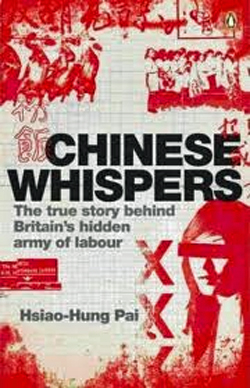
You know the people in this book. You’ll remember the harassed waitress from your local Chinese restaurant. You’ve noticed those builders across the street working funny hours and without helmets. You’ve eaten the lettuce they picked, or bought the microwave they assembled. The words ‘cockle-pickers’, ‘Morecambe Bay’, ‘Chinese illegals found dead in lorry’ will ring a bell. But did you know that there are hundreds of thousands of illegal Chinese immigrants in Britain? They’ve travelled here because of desperate poverty, and must keep their heads down and work themselves to the bone. Hsiao-Hung Pai, the only journalist who knows this community, went undercover to hear the stories of this hidden work force. She reveals a scary, shadowy world where human beings are exploited in ways unimaginable in our civilized twenty-first century. Chinese Whispers exposes the truth behind the lives of a hidden work force here in Britain. You owe it to yourself, and them, to read it.
Posted on October 17, 2010 by The Orwell Prize -

An unprecedented insight into the grim brutality of the Russian revolution and the terror of the Cold War. On a midsummer day in 1937, the young Commissar Boris Bibikov kissed his two daughters goodbye and disappeared into the official Packard waiting outside. It was the last time his family ever saw him. Arrested by Stalin’s secret police, the loyal Party man confessed to a grotesque series of crimes against the Revolution. His wife, an Enemy of the People by association, was sent to the gulag, leaving the young Lyudmila and Lenina alone to face separation in a world turned suddenly cold. Lyudmila grew up a fighter, and when she fell in love with a tall young foreigner in Moscow at the height of the Cold War, she knew there would be further battles ahead. Naively infatuated with Russia, Mervyn Matthews had embarked on a dangerous flirtation with the KGB. But when finally asked to work for the organisation, he refused. Revenge came quickly: Mervyn was thrown out of the country; Lyudmila lost her job. For six years, stranded on opposite sides of the ideological divide that shaped their generation, they kept their love alive in a daily stream of letters – some anguished, some funny, but all suffused with a hope that they would eventually be reunited. Decades later, Owen Matthews pieces together his grandfather’s passage through the harrowing world of Stalin’s purges, and tells the story of his parents’ Cold War love affair through their letters and memories. Interspersed with the story of his family is his own journey as a young reporter in nineties Moscow. This is a raw, vivid memoir about a young man’s struggle to understand his parents’ lives and the strange country which ‘made us and freed us and very nearly broke us.’
Posted on October 17, 2010 by The Orwell Prize -

I am Alix Mortimer, head of state in the People’s Republic of Mortimer, where everything is perfect. I am a thinker-up and writer-down of things and southerner out of water, now living in Manchester. I started out as a postgraduate medievalist, then became a professional sub-editor and then a tax consultant (no, really) before I realised that having a Proper Career much less fun than thinking up and writing down. Now I work freelance as a copywriter, report writer and researcher, mainly for the third sector, and write the odd article on politics, history or genealogy in between times. Unnaturally interested in a number of things, including but not limited to history (policy-making, for the use of), local economics, heritage, language, armchair psychology and the future of political communication (we’ll look back on our current efforts and laugh, believe me).
Submitted blogposts
Other links
Posted on October 17, 2010 by The Orwell Prize -

Gender: Male Occupation: Project Worker/Support Worker Location: Scallysville, Chavshire, United Kingdom
Submitted blogposts
- Children in Care – Winston Smith, 17/02/09
- Living Arrangements – Winston Smith, 25/02/09
- Social dis-services at it again – Winston Smith, 03/03/09
- Crisis Funds – Winston Smith, 25/03/09
- The Deadly Case of Assault with a Can of Deodorant – Winston Smith, 03/04/09
- The Right to be Morbidly Obese – Winston Smith, 11/04/09
- Addicted to Idleness – Winston Smith, 22/05/09
- Just Another Burden on the Welfare State – Winston Smith, 09/07/09
- A Self Sustaining Egalitarian Redistributive Food System – Winston Smith, 12/11/09
- Driving Miss Crazy – Winston Smith, 12/12/09
Other links
Posted on October 17, 2010 by The Orwell Prize -
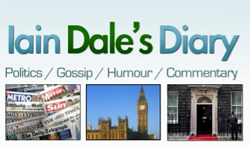
Iain Dale is one of Britain’s leading political commentators, appearing regularly on TV and radio. Iain is best known for his political blog, Iain Dale’s Diary, and football blog, West Ham Till I Die. He is a contributing editor and columnist for GQ Magazine, writes for the Daily Telegraph and a fortnightly diary for the Eastern Daily Press. He was the chief anchor of Britain’s first political internet TV channel, 18 Doughty Street.com and is a presenter on LBC Radio. He appears regularly as a political pundit on Sky News, the BBC News Channel, Newsnight, Radio 4 and Radio 5 Live. He is the publisher of the monthly magazine, Total Politics and the author or editor of more than twenty books. He is managing director of Biteback Publishing.
Submitted blogposts
Other links
- Iain Dale’s Diary
- Iain Dale, Peter Hitchens and Ed Vaizey, ‘What is the big Conservative idea?’ at the Sunday Times Oxford Literary Festival 2009
Posted on October 17, 2010 by The Orwell Prize -
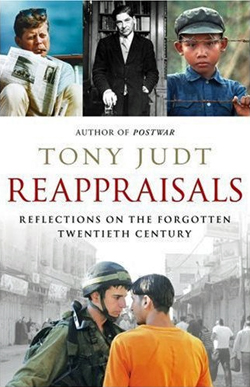
As Tony Judt argues persuasively in Reappraisals, we have entered an ‘age of forgetting’. Today’s world is so utterly unlike the world of just twenty years ago that we have set aside our immediate past even before we could make sense of it. We literally don’t know where we came from, and the results of this burgeoning ignorance are proving calamitous, with the clear prospect of worse to come. We have lost touch with three generations of international policy debate, social thought and public-spirited social activism. We no longer know how to discuss such concepts and we have forgotten the role once played by intellectuals in debating, transmitting and defending the ideas that shaped their time. In Reappraisals, Tony Judt resurrects key aspects of the world we have lost and reminds us how important they still are to us: now and to our hopes for the future. Judt draws provocative connections between a dazzling range of subjects, from the history of the neglect and recovery of the Holocaust and the challenge of ‘evil’ in understanding the European past, to the rise and fall of the state in public affairs and the displacement of history by ‘heritage’.Ranging with his trademark acuity and élan from Belgium to Israel, from the memory of Marxism to the practice of foreign policy, he takes us beyond what we think we know to show us how we came to know it, and reveals how much of our history has been sacrificed in the triumph of myth-making over understanding and denial over memory. His book is a road map back to the historical sense we urgently need.
Posted on October 17, 2010 by The Orwell Prize -

Shortlisted for blogposts published at Penny Red, LabourList, The Huffington Post, The F-Word, Liberal Conspiracy and Comment is Free. A socialist, feminist, deviant, reprobate, queer, journalist, aspiring author, freelance copywriter and sometime blogger. She lives with toast-eating pagans in a little house somewhere in London out of a small red suitcase, smoking and drinking and plotting to subtly re-arrange the world to suit her ideals. Consumes too much tea. Regrets nothing.
Submitted blogposts
Other links
Posted on October 17, 2010 by The Orwell Prize -

My name is David Allen Green, and I am a lawyer and writer living in London. This is my personal blog. It is named after a medieval folklore hero – a wizard that bested the devil. The blog became well-known for its detailed and accessible coverage of the libel case brought against Simon Singh by the British Chiropractic Association, 2008-10. However, this blog covers many other legal and policy areas, usually from a liberal and critical perspective. It is not a party-political or partisan blog.
Submitted blogposts
Other links
Posted on October 15, 2010 by The Orwell Prize -

One of the country’s most respected financial journalists and commentators, Hamish McRae is an associate editor of The Independent. He was named Business and Finance Journalist of the Year 2006 at the British Press Awards.
Submitted articles
Other links
Posted on October 15, 2010 by The Orwell Prize -

To follow.

















